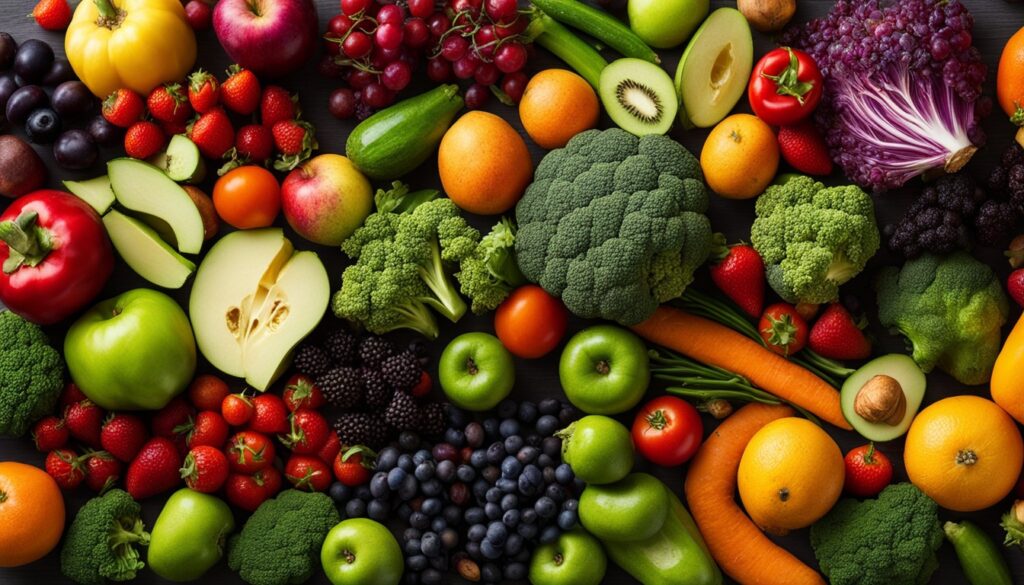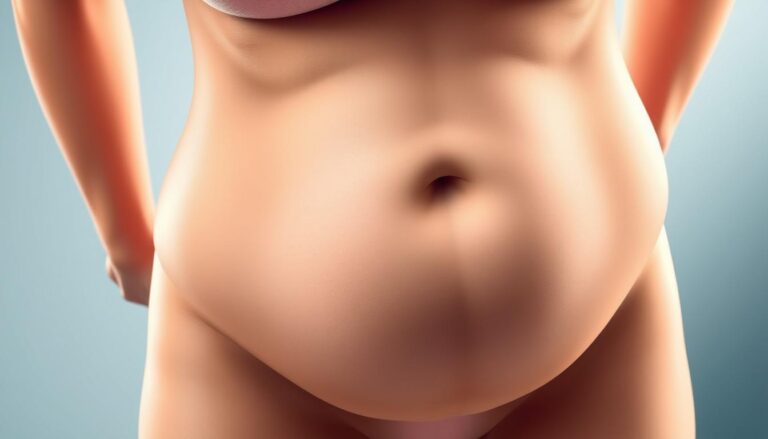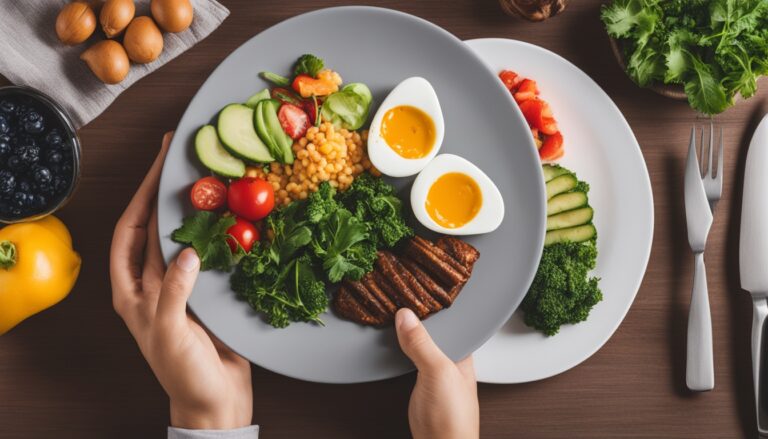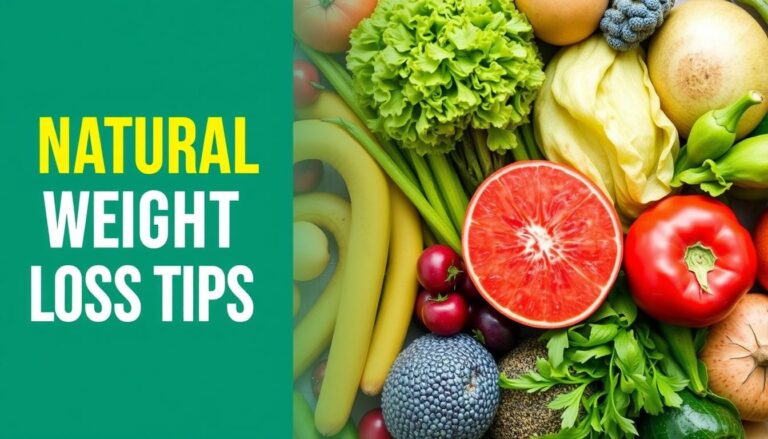Are you tired of struggling with your weight, constantly searching for a solution that actually works? Prepare to be surprised – the secret to sustainable weight loss might be simpler than you think. In this article, we’ll uncover 9 proven strategies that will have you shedding those stubborn pounds and transforming your health in no time1.
Key Takeaways
- Embrace intermittent fasting for effective weight loss
- Track your diet and exercise to stay accountable
- Practice mindful eating to savor every bite and feel more satisfied
- Start your day with a protein-rich breakfast to curb hunger
- Ditch refined carbs and added sugars for better weight management
Embrace Intermittent Fasting
Intermittent fasting is a popular way to lose weight. It involves fasting and eating in cycles. This method helps your body use short-term calorie restriction to its advantage2. Studies show it can be as effective as a daily low-calorie diet for weight loss2.
There are several ways to do intermittent fasting. The 16/8 method limits eating to an 8-hour window, helping with weight loss2. This method can also prevent high blood pressure and reduce how much you eat2. The 5:2 diet involves eating normally for five days and cutting calories for two days. It’s good for losing weight and controlling blood sugar in type 2 diabetes2. Alternate-day fasting is another method that helps with weight loss and is as effective as daily calorie cutting2.
Intermittent fasting can burn fat by lowering insulin levels and boosting norepinephrine, which helps break down fat for energy2. Short-term fasting, like alternate-day fasting, can lead to weight and fat loss. However, more research is needed on its long-term effects2. It’s important to eat healthily on non-fasting days and avoid overeating to see results.
Not everyone may find 16:8 fasting suitable, but intermittent fasting is flexible3. Starting with a 10-hour fast and gradually increasing it can help you get into it3. Intermittent fasting is a personal choice that should fit your health goals and lifestyle3.

“In early times, people naturally fasted for 14-16 hours due to lack of electricity or natural light.”
Adding intermittent fasting to your routine can bring many benefits. These include losing fat, keeping muscle mass, improving digestion, lowering blood sugar, and reducing blood pressure3.
Track Your Diet and Exercise
For lasting weight loss, tracking your diet and exercise is key4. Studies show that keeping an eye on what you eat and how much you move can lead to better habits and motivation5.
Begin by writing down what you eat in a journal, either on paper or with an app4. This helps you notice your eating habits and find ways to improve4. By tracking your meals and snacks, you’ll understand your calorie and nutrient intake better, helping you make healthy changes5.
Alongside tracking your food, use a fitness tracker or pedometer to monitor your activity4. These tools give you details on your steps, active time, and movement. They keep you on track and motivated to exercise5.
| Nutrient | Recommended Daily Intake |
|---|---|
| Protein | Adults: 5-7 oz, Children 2-8: 2-5.5 oz, Children 9-13: 4-6.5 oz, Adolescents 14-18: 5-7 oz4 |
| Vegetables | Adults: 2-5 cups, Children 2-8: 1-2.5 cups, Children 9-13: 1.5-3.5 cups, Adolescents 14-18: 2.5-4 cups4 |
| Healthy Fats | Adults: 22-44 g, Children 2-8: 15-24 g, Children 9-13: 17-34 g, Adolescents 14-18: 24-51 g4 |
Regularly tracking your diet and exercise gives you insights into your habits. This helps you make lasting changes that support your weight loss5. Stay dedicated, and you’ll see your progress over time.
![]()
Mindful Eating: Savor Every Bite
Mindful eating is a way to be fully present and attentive when we eat. It helps us nourish our bodies and can aid in weight loss. It stops us from eating too much without realizing it6.
Studies show that mindful eating leads to better food choices. People choose fruits over sweets and eat smaller portions of high-calorie foods6. It also helps reduce binge and emotional eating, making us more aware of when we’re full6.
Eating slowly can also affect how much we eat7. Slower eaters tend to eat less because they feel full sooner. This shows how mindfulness helps control our food intake6. Mindful eating also helps us make choices that are good for our health and enjoy our meals more6.
Even though mindfulness might not always lead to weight loss, it’s still valuable for a healthy lifestyle6. As research grows, we’ll need better tools to understand how mindfulness affects our health and prevents diseases6.
Mindful Eating Techniques
To eat more mindfully, try these tips:
- Sit down to eat without distractions like phones or TVs.
- Eat slowly and enjoy each bite.
- Notice the colors, textures, and smells of your food.
- Check if you’re hungry or full before eating more.
- Choose what and how much you eat to nourish your body.
By eating mindfully, you can enjoy food more and support your weight loss in a lasting way.

“The greatest weapon against stress is our ability to choose one thought over another.” – William James
| Mindful Eating Benefits | Conventional Diets |
|---|---|
|
|
Practicing mindful eating leads to a better way of managing weight. It’s good for both your body and mind8.
Start Your Day with a Protein-Rich Breakfast
Start your day with a high-protein breakfast to help control your hunger and stay full longer. Studies show that eating at least 20 grams of protein in the morning aids in weight loss9. Increasing your protein to 30% of your daily calories can cut down calories by 441 per day and help you lose 11 pounds in 12 weeks9. A study found that eating eggs for breakfast led to a 61% drop in BMI, 65% more weight loss, and a 34% decrease in waist size compared to a bagel breakfast with the same calories9.
A high-protein breakfast works well for weight loss because it affects your appetite hormones. It can reduce calorie intake by up to 135 calories later in the day, improving hormones like ghrelin and others9. Protein also uses more calories to metabolize than carbs or fat, which can help you burn an extra 100 calories daily and protect muscle during calorie cutting9.
Great options for a high-protein breakfast include eggs, oats, nut and seed butters, quinoa porridge, sardines, and chia seed pudding. Starting with a protein-rich meal can help you begin your weight loss journey and control your hunger all day.
“A high-protein breakfast is a game-changer for weight loss and appetite regulation.”
| Protein Source | Protein Content (per serving) |
|---|---|
| Eggs | 6-12 grams |
| Oats | 5-10 grams |
| Nut and Seed Butters | 7-8 grams |
| Quinoa Porridge | 8-12 grams |
| Sardines | 22-25 grams |
| Chia Seed Pudding | 4-6 grams |
Adding a high-protein breakfast to your daily routine can improve appetite control, increase fullness, and support weight loss. Begin your day with a nutritious, protein-rich meal9.
Ditch Refined Carbs and Added Sugars
The type of carbs you eat affects your weight. Refined carbs like white bread and pasta are quickly digested and can lead to weight gain10. On the other hand, whole grains such as brown rice and quinoa are absorbed slowly. They help you feel full for longer10.
Added sugars in processed foods and drinks also contribute to weight gain10. A single can of non-diet cola has 35 grams of carbs, mostly from sugar10. Drinking sugar-sweetened drinks often raises the risk of type 2 diabetes. This shows why cutting down on these drinks is key10.
Fruit juices might seem healthy but can be high in sugar and carbs. A 10-ounce bottle of apple juice has about 35 grams of carbs, similar to sugary drinks10. Even foods like granola and Raisin Bran cereal can have a lot of added sugars. This can cause blood sugar spikes and weight gain10.
Even natural sweeteners like honey are high in carbs, with one tablespoon having 17 grams10. To avoid these issues, choose whole-grain foods, fruits, nuts, and seeds instead10. You can also try using low-carb flours like coconut or almond flour in baking for a healthier option10.

“The Western diet is increasingly high in added sugars, which have been linked to obesity, even when the sugar occurs in beverages rather than food.”
Load Up on Fiber
Dietary fiber is key for a healthy diet, helping with weight loss and overall health. It can’t be digested in the small intestine, unlike sugar and starch11. Eating lots of fiber-rich foods can make you feel full, which helps with weight control12.
Women should aim for 25 grams of fiber a day, and men should aim for 38 grams11. Sadly, most Americans only get about 16 grams a day, which is less than needed11. But, there are many tasty, high-fiber foods to pick from, such as:
- Whole-grain breakfast cereals, whole-wheat pasta, and whole-grain bread11
- Oats, barley, and rye11
- Fruits, vegetables, peas, beans, pulses, nuts, and seeds11
For example, an ounce of popcorn gives you 4 grams of fiber11. A small pear has almost 5 grams11, and an ounce of chia seeds has an amazing 10 grams11. Adding these foods to your diet can make you feel full and help with weight loss12.

“Fiber is an essential part of a healthy diet and can play a key role in weight management. By making simple swaps to incorporate more fiber-rich foods, you can feel fuller for longer and potentially shed unwanted pounds.”
Nurture Your Gut Health
Research shows gut bacteria play a big role in managing weight. Each person has a unique mix of gut microbes. Some bacteria can make you gain weight by increasing how much energy your body gets from food13. To keep your gut healthy and help with weight loss, eating gut-friendly foods is key.
Probiotic foods like yogurt, kefir, sauerkraut, and kimchi add good bacteria to your gut14. Prebiotic foods, like chicory root, onions, garlic, and bananas, feed these good bacteria13. Also, eating a variety of fruits, vegetables, whole grains, and nuts helps your gut microbiome15.
- Add fermented foods like yogurt, kefir, and kimchi to increase good gut bacteria14.
- Eat foods high in prebiotics, such as chicory root, onions, garlic, and bananas, to feed your gut microbes13.
- Choose a variety of plant-based foods, including fruits, vegetables, whole grains, and nuts, for a healthy gut15.
Eating a diet rich in nutrients and fiber supports your gut health and weight loss13. A healthy gut microbiome helps with weight management and boosts your mental and physical health13.

“Nurturing your gut health is a powerful step towards achieving your weight loss goals and overall wellness.” – Dr. Sarah Brewer, Nutritionist
Prioritize Quality Sleep
Many studies link getting less than 5-6 hours of sleep to more obesity16. Not sleeping well can slow down how your body uses calories16. It can also make insulin resistance worse and raise stress hormones, leading to fat gain16. So, it’s key to aim for 7-9 hours of good sleep each night to manage your weight well.
About 35% of US adults sleep less than 7 hours nightly, says the CDC17. Research points out that not sleeping enough or poorly can cause weight gain and increase the risk of obesity and other health issues16.
- One study found that sleeping less than 7 hours a night raises obesity risk by 41%17.
- Another review of 33 studies linked short sleep with obesity in adults and kids17.
- Poor sleep can make you eat 385 more calories a day17.
- Being awake late can lead to more hunger, cravings, and eating more17.
Eating late at night is linked to gaining more weight and a higher BMI17. Working out can help you fall asleep faster and improve sleep quality17.
“Losing sleep while dieting can reduce the amount of weight lost and encourage overeating.”16
Getting quality sleep is crucial for staying healthy and at a good weight. Restful sleep helps your metabolism, controls hunger hormones, and leads to better food choices1617.
9 Tips FOR Weight Loss
Shedding extra pounds can be tough, but with the right strategies, you can do it. Here are 9 tips to help you lose weight and improve your health:
- Embrace Intermittent Fasting: This eating pattern involves short-term fasts. It helps create a calorie deficit and boosts metabolism18.
- Track Your Diet and Exercise: Keeping an eye on what you eat and how much you move can help you lose weight better18.
- Practice Mindful Eating: Enjoy your food, listen to your body, and eat with awareness. This can lead to healthier eating habits18.
- Start Your Day with a Protein-Rich Breakfast: Eating a nutritious breakfast can help control your appetite and calorie intake all day19.
- Ditch Refined Carbs and Added Sugars: Choose whole, fiber-rich carbs and eat less processed foods to avoid weight gain20.
- Load Up on Fiber: Fiber makes you feel full, helps with calorie control, and supports healthy digestion20.
- Nurture Your Gut Health: A healthy gut microbiome can improve your metabolism, appetite, and weight management18.
- Prioritize Quality Sleep: Good sleep helps control hunger, satiety, and energy levels20.
- Build a Strong Support System: Having people who support you is key. Also, getting professional help when needed is important18.
Remember, losing weight for good takes a mix of these strategies. By following these 9 tips, you’re on your way to losing weight and reaching your health goals182019.
Conclusion
Starting a weight loss journey can change your life for the better. It can make you healthier and more vibrant. By following the 9 tips in this article, like trying intermittent fasting21, you can lose weight and keep it off22.
Successful weight loss isn’t about quick fixes or fad diets. It’s about making changes that last. Eat mindfully21, eat foods full of nutrients, and stay active21. With time, effort, and a positive attitude, you can meet your weight loss goals. This will start a journey to a healthier, happier you.
Losing weight does more than improve your health. It can also make you feel better mentally, more confident, and improve your life quality. Use this chance to take control of your weight loss. Aim for a life full of energy, joy, and freedom. With the right lifestyle changes, getting slimmer and healthier is easy.





